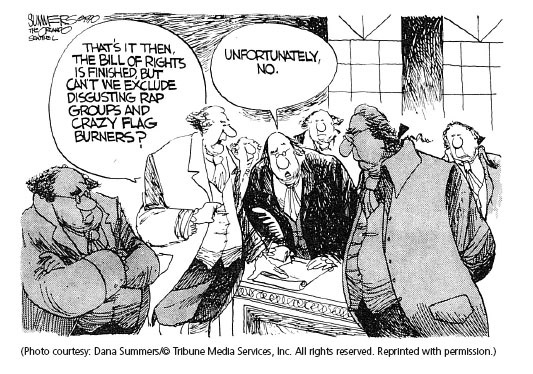 Readings: Free Speech
Readings: Free Speech

In the First Amendment are found the five basic freedoms of American citizens. The freedoms of speech and press are often called our freedom of expression. The freedom of assembly is analogous with our freedom to associate with whom we please, and the right to petition government is the right to demand change from government. All are essential to a free people.
In this reading you will examine two important Supreme Court
cases involving the freedom of expression. What rights do we as
citizens have to express our dissatisfaction with our government?
When do our actions go too far?
 Schenck v. US
(1919)
Schenck v. US
(1919)
Read and listen along with this excerpt from the decision in Schenck v. US written by Justice Holmes. This case dealt with protestors who obstructed the draft during World War I and were charged under the Espionage Act of 1917.
The question in every case is whether the words used are used in such circumstances and are of such a nature as to create clear and present danger that they will bring about the substantive evils that Congress has a right to prevent. It is a question of proximity and degree. When a nation is at war many things that might be said in time of peace are such a hindrance to its effort that their utterance will not be endured so long as men fight and that no Court could regard them as protected by any constitutional right.
No, the Court definitely considers the circumstances of each situation. If it creates a clear and present danger then speech may not be protected!
 Texas
v. Johnson (1989)
Texas
v. Johnson (1989)
Read and listen along with this excerpt from the decision in Texas v. Johnson. This is another freedom of expression case involving flag burning. Listen first to the majority opinion and then listen to the dissenting opinion.
The question in every case is whether the words used are used in such circumstances and are of such a nature as to create clear and present danger that they will bring about the substantive evils that Congress has a right to prevent. It is a question of proximity and degree. When a nation is at war many things that might be said in time of peace are such a hindrance to its effort that their utterance will not be endured so long as men fight and that no Court could regard them as protected by any constitutional right. To conclude that the government may permit designated symbols to be used to communicate only a limited set of messages would be to enter territory having no discernible or defensible boundaries….In evaluating these choices under the First Amendment, how would we decide which symbols were sufficiently special to warrant this unique status? To do so, we would be forced to consult our own political preferences, and impose them on the citizenry, in the very way that the First Amendment forbids us to do.. ..
This would be sending an unclear message about which symbols would warrant the special status. Individual political preferences would be used and imposed on the citizens and that is what the First Amendment prohibits.
The American flag, then, throughout more than 200 years of our history, has come to be the visible symbol embodying our Nation. It does not represent the views of any particular political party, and it does not represent any particular political philosophy. The flag is not simply another "idea" or "point of view" competing for recognition in the marketplace of ideas. Millions and millions of Americans regard it with an almost mystical reverence regardless of what sort of social, political, or philosophical beliefs they may have. And It is "no essential part of any exposition of ideas, and list of such slight social value as a step to truth that any benefit that may be derived from it is clearly out-weighed" by the public interest in avoiding a probable breach of the peace……. so inherently inflammatory that it may cause a breach of public order....
The flag is a visible symbol of our nation that does not represent a specific political party or political philosophy. And that any benefit of allowing this is out-weighed in the interest of public order in avoiding a breach of the peace or public order.